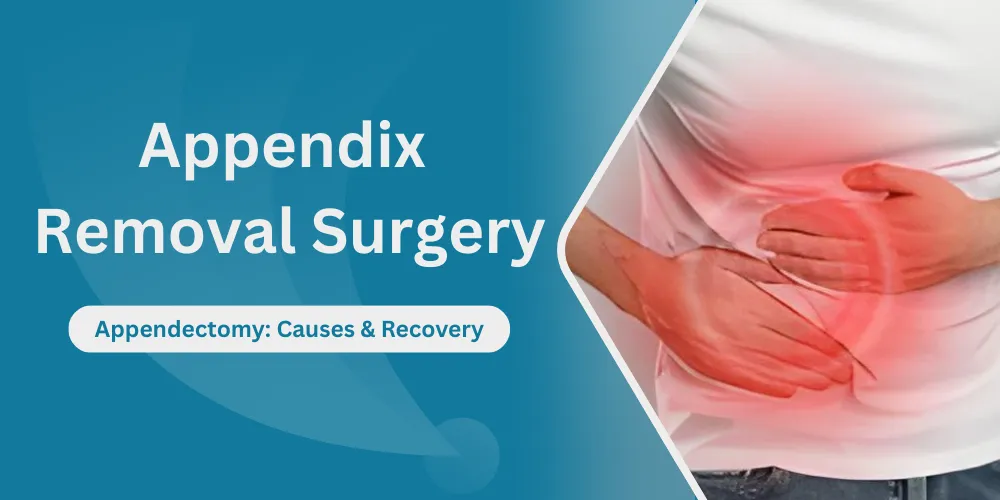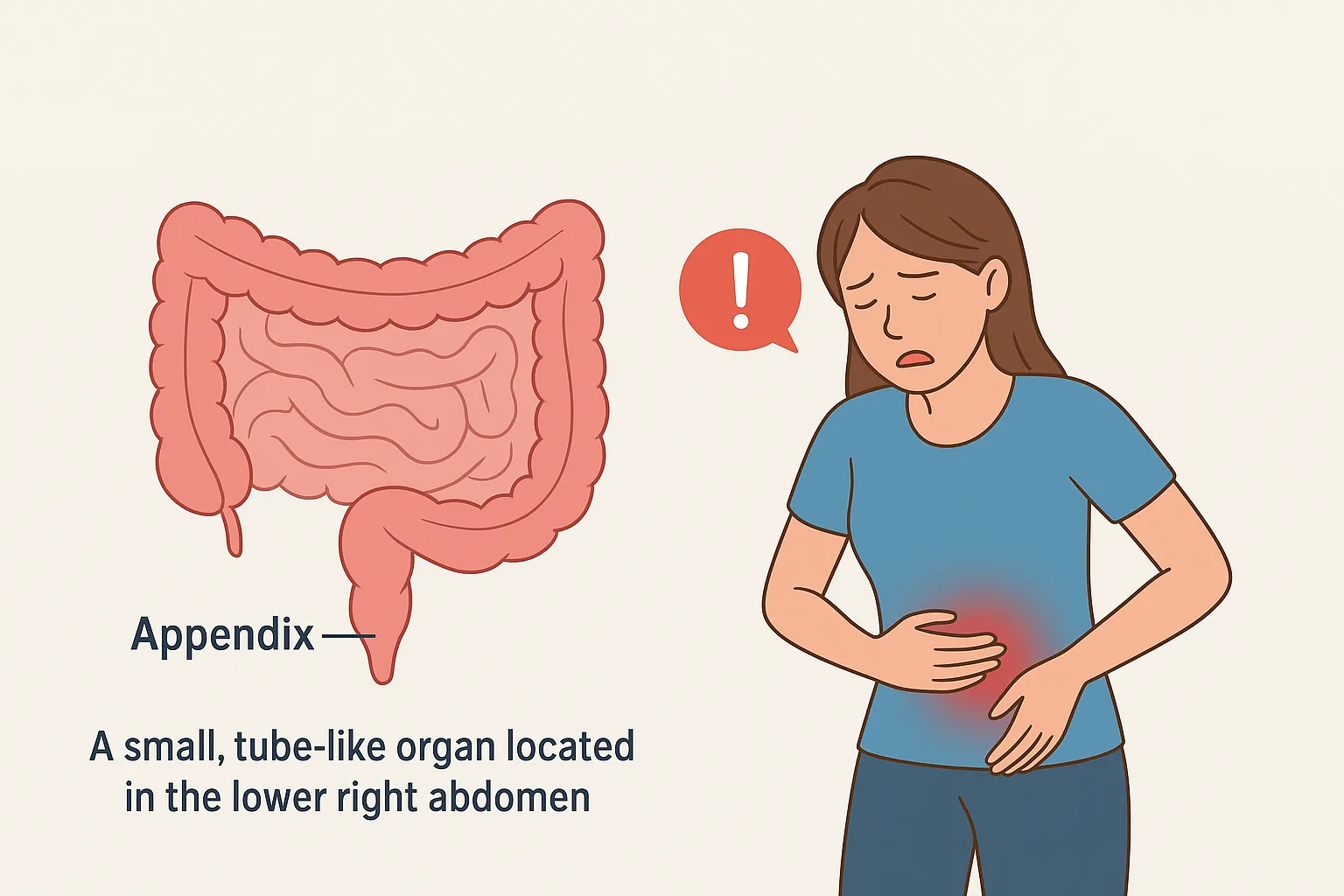Appendix Removal Surgery (Appendectomy): Causes & Recovery Tips

- September 5, 2025
- City Hospital
The appendix might be a tiny, finger-shaped pouch located in the lower right Stomach, but when it becomes inflamed, it can cause a medical emergency known as appendicitis. For decades, the only effective treatment for this condition has been appendectomy, or appendix removal surgery. If left untreated, appendicitis can lead to a ruptured appendix, spreading infection throughout the abdomen—a life-threatening condition. Understanding what the appendix does, why appendectomy is needed, and how recovery works can help patients prepare both physically and mentally.
Despite this potential role, the appendix is not critical for survival. People can live perfectly normal lives without it. This is why removing the appendix when inflamed does not cause long-term health issues.
What is an Appendectomy?
An appendectomy is a surgical procedure performed to remove the appendix, usually due to appendicitis. It is one of the most common emergency surgeries performed worldwide. The surgery ensures that the inflamed appendix does not rupture and spread infection.
It has become safer and more effective due to modern surgical advancements. Now, doctors can perform it using minimally invasive methods, which allow patients to recover faster with fewer complications.
Causes Leading to Appendectomy
Several factors may lead to the need for appendix removal, with appendicitis being the most common.
Acute Appendicitis: This occurs when the appendix becomes inflamed due to infection. If untreated, the appendix may rupture, spreading bacteria throughout the abdomen.
Blockage in the Appendix: A blockage caused by stool, parasites, or even tumors can obstruct the appendix, trapping bacteria inside. This quickly leads to swelling and infection.
Infections: Sometimes, infections in the digestive tract spread to the appendix, causing it to swell. Viral or bacterial infections are both possible triggers.
Trauma or Injury: Though rare, abdominal trauma can damage the appendix and lead to inflammation, requiring removal.
An appendectomy is a surgical procedure performed to remove the appendix, usually due to appendicitis. It is one of the most common emergency surgeries performed worldwide. The surgery ensures that the inflamed appendix does not rupture and spread infection.
It has become safer and more effective due to modern surgical advancements. Now, doctors can perform it using minimally invasive methods, which allow patients to recover faster with fewer complications.
Causes Leading to Appendectomy
Several factors may lead to the need for appendix removal, with appendicitis being the most common.
Acute Appendicitis: This occurs when the appendix becomes inflamed due to infection. If untreated, the appendix may rupture, spreading bacteria throughout the abdomen.
Blockage in the Appendix: A blockage caused by stool, parasites, or even tumors can obstruct the appendix, trapping bacteria inside. This quickly leads to swelling and infection.
Infections: Sometimes, infections in the digestive tract spread to the appendix, causing it to swell. Viral or bacterial infections are both possible triggers.
Trauma or Injury: Though rare, abdominal trauma can damage the appendix and lead to inflammation, requiring removal.
Symptoms of Appendicitis
Recognizing appendicitis early can save lives. Common symptoms include:
Abdominal Pain: Pain usually begins near the belly button and shifts to the lower right abdomen. Stomach pain worsens over time and becomes sharper.
Nausea and Vomiting: Inflammation often triggers the stomach to react, causing nausea and vomiting shortly after the pain begins.
Fever: A mild fever is the body’s natural response to infection. In severe cases, high fever may indicate a ruptured appendix.
Loss of Appetite: Many patients with appendicitis experience a sudden disinterest in food.
Digestive Issues: Constipation, bloating, or diarrhea can accompany appendicitis, making diagnosis more challenging.
Recovery Tips After Appendix Removal Surgery (Appendectomy)
1. Pain Management
After surgery, some level of discomfort is expected, especially near the incision site. Managing this pain effectively helps you move around and heal faster.
Follow Prescribed Medication: Take painkillers as directed by your doctor. Avoid self-medicating with over-the-counter drugs unless approved.
Cold Compress: Applying a cold pack to the incision area for 10–15 minutes can reduce swelling and pain.
Stay Relaxed: Stress increases discomfort. Practice deep breathing exercises or gentle meditation to keep your body calm.
Gradual Movement: While bed rest helps initially, too much lying down can stiffen muscles and worsen soreness. Gentle walking reduces stiffness and improves circulation.
2. Caring for the Surgical Wound
The incision site is prone to infection if not handled carefully. Proper wound care ensures smooth healing.
Keep It Clean and Dry: Do not scrub or soak the incision until your doctor says it’s safe. Showers are usually allowed after 24–48 hours, but baths should be avoided.
Dressing Changes: If bandages are applied, change them as instructed. Always wash your hands before touching the wound.
Watch for Signs of Infection: Redness, swelling, pus, or persistent pain are warning signs. If you develop a fever, call your doctor immediately.
Avoid Tight Clothing: Loose-fitting clothes prevent friction and allow the wound to heal without irritation.
3. Diet and Nutrition During Recovery
Food plays a big role in how quickly your body heals after surgery. Since the digestive system is affected, introducing foods gradually is crucial.
Start with Clear Liquids: Broths, soups, herbal teas, and fruit juices are easier to digest in the first 24–48 hours.
Move to Soft Foods: Yogurt, mashed potatoes, porridge, and oatmeal are gentle on the stomach and provide energy.
Include Fiber Slowly: Add vegetables, fruits, and whole grains gradually to prevent constipation.
Stay Hydrated: Drinking 8–10 glasses of water daily helps digestion and keeps stools soft.
Avoid Irritants: Spicy, oily, and processed foods may upset the stomach and delay healing.
4. Activity and Physical Movement
Although rest is essential, staying active promotes circulation and prevents complications like blood clots.
First Few Days: Limit movement to short walks around your room or home.
Avoid Heavy Lifting: Do not lift objects heavier than 5–10 pounds for at least 4–6 weeks.
Listen to Your Body: If you feel pain or fatigue, stop and rest.
Gradual Exercise: Gentle stretching and light walking can be introduced after a week. High-intensity workouts should wait until your doctor approves.
Support Your Abdomen: When sneezing or coughing, hold a pillow against your stomach to reduce pressure on the incision.
5. Managing Bowel Movements
Constipation is common after surgery due to anesthesia, painkillers, and reduced activity.
Eat Fiber-Rich Foods: Fruits, vegetables, and whole grains help regulate digestion.
Drink Plenty of Water: Fluids soften stools, making bowel movements easier.
Gentle Movement: Walking stimulates the intestines and prevents constipation.
Avoid Straining: Forcing bowel movements can put pressure on the incision and cause discomfort.
Don’t Ignore Your Abdominal Pain – Get Expert Help Today!
If you or your loved one is experiencing severe abdominal pain, swelling, or any symptoms that may indicate appendicitis, consult our Gen. & Laparoscopic Surgery specialist doctors in Gurdaspur, Abrol Hospital, immediately. Early diagnosis and timely treatment can prevent serious complications.
📞 Call us now to book your consultation or visit our hospital today for trusted, expert care.

FAQs (Frequently Asked Questions)
Appendix problems, such as appendicitis, are usually caused by a blockage in the appendix. This blockage can be due to hardened stool, infection, swollen lymph nodes, or in rare cases, tumors. The blockage leads to inflammation, pain, and sometimes infection.
Appendix pain usually starts as a dull ache near the belly button and then shifts to the lower right side of the abdomen. The pain often worsens with movement, coughing, or deep breathing. Other symptoms may include nausea, vomiting, loss of appetite, fever, and abdominal swelling.
No, appendix pain (appendicitis) cannot be permanently treated at home. Appendicitis is a medical emergency that often requires surgical removal of the appendix. However, some traditional remedies like fenugreek seeds are believed to help reduce infection or inflammation. For example, boiling two tablespoons of fenugreek seeds in one liter of water and consuming it as a herbal drink is thought to prevent the formation of mucus and pus inside the appendix. Still, this should only be considered as a supportive measure and not a replacement for medical treatment.
Yes, appendix removal is one of the most common and safest surgical procedures. Most patients recover quickly and resume normal activities within 1–3 weeks.
Search Keywords
